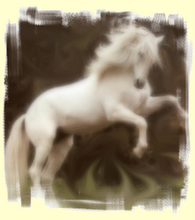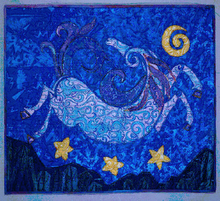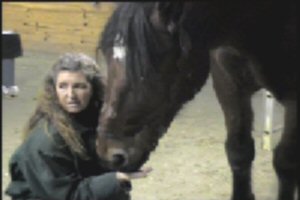What on earth does
politics have to do with horses? Well, let's take a look at what
politics does to humans and then see how politics works in the equine
world.
In a feral herd of horses or any large herd of horses there is going
to
be disagreements between members of the herd. As I said in my
previous
post, each horse is an individual. Aside from that the larger picture
holds a social order in the equine world to which each member of the
herd strongly adheres, unlike what our own social order has come to
be.
There is the alpha mare. The one mare who looks out for ALL the
others.
The Queen, you might call her. Generally, she's not one with whom the
others will cozy up and make nice. She has a job to do and will not
be
bothered by others. If someone does bother her he or she is quickly
reminded of just with whom he's dealing! A swift kick or a bite on
the
shoulder with little warning. This alpha mare retains her position
until another mare dukes it out with her and wins the battle. The two
can become extremely physical about it and irrepairable injuries
might
arise as a result.
Now the main herd is broken into smaller family groups or sub groups
each wtih its own Lead mare. This lead mare is CHOSEN to be the lead
mare by the others. Her position is a very important one within the
family sub group ... she is the nurturer, the sentry, the teacher,
the
fixer, the peace keeper, ... (hey Moms ... sound familiar?) Her
demeanor is consistent in attitude (little PMS from this gal!)... she
teaches the herd social order with encouragement and humor/play. The
others look to her for their safety, their "feel-good", their very
lives.
This is the position in the herd that we humans would like to assume.
Now, a little bit more ... also, within the sub groups, are other
mares, a stallion and generally several youngsters. These immature
youngsters are the ones who are lower in the social ranking and are
just learning the ropes. They fight for social position ...
physically,
with the lowest members doing the most fighting. As they mature they
find their places out in their bachelor bands (if stallions) and then
in their own families as they seek out to establish them about 7
years
of age or so.
There are some horses who remain low in the social order throughout
their lives. This is evidenced by their constant physical attempts
to "overthrow" the next up in line. It is also evidenced by the
feeling
one gets while around them of watching a bully in a schoolyard. This
behavior is based on fear - the fear of losing.
While some horses will mature and find their niche comfortably,
assuming their positions in the social rule (remember, I said Lead
Mares are "chosen" simply because of their demeanors) ... utilizing
their confident assertiveness in their roles in order to keep the
peace, the other ones who are bullying their way through the herd use
aggressiveness to assert themselves. (see the human correlation yet?)
Alphas are aggressive; Low rankers are aggressive. Aggression is born
from fear.
The "higher ups" and the Lead mare are assertive. Assertiveness is
born
from confidence and maturity (not age-related maturity but personal,
life maturity - wisdom. Some are wiser than others even though
decades
younger while some might think/wish they were wiser but resort to
sneaky games and passive aggressiveness that belie their outer
appearances. )
A very quick lesson in equine social order that can easily be
transferred to human social order.
Are you a true leader or are you an alpha or lower ranking herd
member?
How can one learn to be a leader? How can one learn thoughtful
assertiveness instead of reactionary aggressiveness?
Watch your horses with the intent to learn from them. Watch the
leader's roles in the herd. Watch and FEEL the demeanors, the intent,
the physical actions, the subtle conversations between two or more
horses.
And then, transfer those findings to yourself, your loved ones,
our 'supposed' leaders *ahem* in the political world ... and you'll
gain a whole lot of insight into not only equine behavior but human,
as well.
Choose our next Leader carefully.
Have a great day, Folks!
Friday, September 12, 2008
Subscribe to:
Post Comments (Atom)



No comments:
Post a Comment